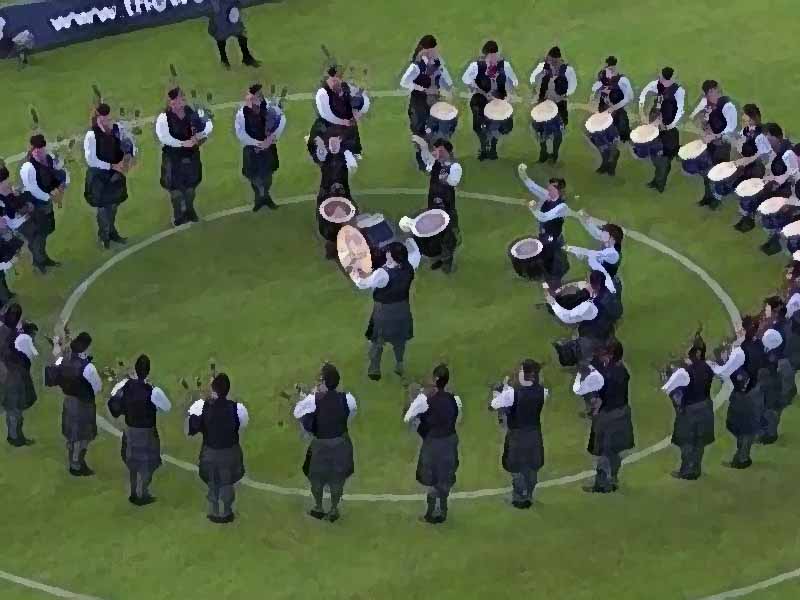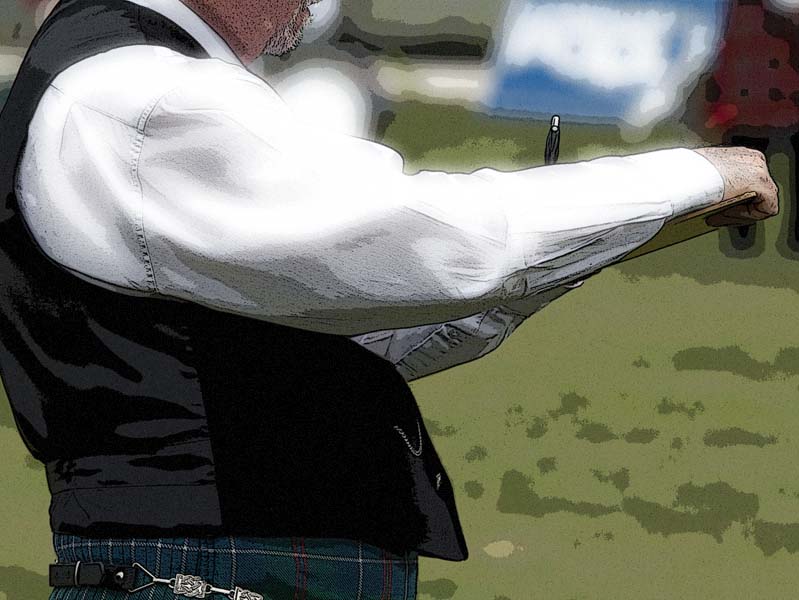Opinion: The pipe band MSR doesn’t have to mean MiSeRy
 The numbers don’t lie.
The numbers don’t lie.
The pipe band march, strathspey & reel as we know it is not popular. It’s not popular with non-players. It’s not popular with judges. And most importantly, it’s not popular with pipers and drummers.
Look at the video views of pipe band MSRs get compared with medleys: at least half the number. Look at the audience gathered at pipe band competitions: they gravitate to medleys. We see that yearly at the World’s and North American Championships, where people would instead hit the beer tent than subject their ears to yet another rendition of “Blair Drummond.”
To be sure, there is a time and place for MSRs as a technical test for solo pipers where audiences don’t much matter, but for pipe bands, the MSR format as we know it has well and truly run its course.
We have said it before, but it bears repeating: the MSR is simply an early form of a medley. The strathspey & reel on its own is a logical progression of tunes derived from Highland dancing. Maybe a march to start is supposed to be the dancer strutting to the actual dance, but tacking on a 2/4 march makes as much or little musical sense as playing a hornpipe, polka, 4/4 march, or another genre in four. A 2/4 march seems arbitrary.
Like piobaireachd, big competition marches, strathspeys and reels can be beautiful things. But they are esoteric pieces that are difficult or even impossible to comprehend by non-players. They are the examples cited when non-piper/drummer listeners say “But it all sounds the same.”
If we accept that the MSR is nothing more than a brief medley, and if the powers that be insist on keeping it as a required format, then why not encourage bands to be creative?
If we accept that the MSR is nothing more than a brief medley, and if the powers that be insist on keeping it as a required format, then why not encourage bands to be creative? Why not add harmony, counter-melodies or inventive percussion? After all, there is nothing in the rules that says bands can’t do that, so why not start the experimentation before the protectors of the past (read: RSPBA) use their power to prevent it?
Ironically, bands routinely riff on big solo competition style MSR tunes in medleys, adding wonderfully creative orchestration, experimenting with time signatures. This shows that, yes, these are great tunes and, to paraphrase the songwriters’ adage: a great tune is always a great tune regardless of its interpretation.
We get it, and we’ve heard it all. The staunch purists proclaim MSRs as the “real” music and the “real” test of pipers and drummers. They cook up every reason imaginable to breathe wind into the old gasbag when, really, it might be better for everyone to pull the plug.
Anyone who claims a pipe band MSR is more complex or intricate than today’s medley probably hasn’t played in a band for 30 years. As a test of musical and technical skill, a modern medley’s orchestration, nuance, technical challenges, and complicated bridges and breaks leave an MSR in its dust.
We encourage associations to look at the audiences and, most importantly, ask their members what they want. After that, act accordingly to attract more learners, retain more players and build bigger audiences – or even any audience.
The Grade 1 medleys and MSRs will be live-streamed by BBC Scotland. They don’t reveal viewership, but we can guarantee that the MSRs will have about half the interest that the medleys garner. Watch the crowd, too: the medley is packed; the MSR exposes plenty of empty seats, even though people paid for them.
The Breton bagad championships are coming up. There will be huge stadium crowds of enthusiastic non-players eager to be enthralled, impressed and entertained. Will the bands be required to play basic traditional Breton music from a century or longer ago with no re-arrangement or orchestration? Merci, mais non.
We can continue to stay hidebound to tradition for tradition’s sake, or we can accept that we’re competing more than ever with short attention spans and myriad other options for how we spend our free time.
We can stick with the past or work to attract more newcomers and entertain more audiences. To us, the choice is obvious.
What do you think? You’re invited to use the Comments feature that follows, which allows you to express your opinion we hope with your name attached but anonymously if you choose.






If the MSR has become stale, it is because we’ve allowed it. The fact that no new music has been introduced into the competition genre for decades is partly to blame. Surely there must be someone who can compose a strathspey to rival Susan MacLeod? There must be other big reels than Brown Haired Maiden and marches other than the half dozen rolled out each season? To the critique that “it all sounds the same.” Well it is! However, the fact that the march, strathspey and reel form a foundation of our music I don’t believe should be ignored. Also, IMHO, the Medley suffers from the same symptoms!
From my wife’s perspective, a non-piper who is hardly unfamiliar with having to listen to pipe bands for over 30 years, her review of the G1 Medley was it was just one constant stream of fast, even playing with little variety. The constant stream of reels that vary little from hornpipes with maybe the obligatory little strathspey tossed in. The now prevalent refrains that seem more obligatory and trendy than structurally relevant. It has all become fast, even and overdone…..all the same from band to band. I was listening to a military band album from the early 1990s (hardly the dark ages). While the tone and unison of playing didn’t meet today’s expectations, the MUSIC was great. A wide variety of our styles, pointed and round, new and trad. All with drum scores that allow the listener to know where the music is and going. No overly complex midsection scores trying to vie for a dominant place in medley. Just good rhythm.
Maybe it is time for the top-of-the-top bands to break out and be given something else? A G1A competition of a 10 minute concert format that must include and MSR? But, hearing the lower grade bands (3 and 4s in the US) struggle with even basic MSRs is something telling. Listening to the Medley and MSR Grade 3 competitions in California, it still is the MSR that separates the pack. Those foundations apparently are being lost in the name of playing tunes that are “more fun.”
Maybe, the solution is to force/encourage bands to pick new music. Reward composers with their big MSRs being rewarded on the competition circle. Bring the playing of the little strathspeys and reels back into the lower grade repertoires more. Give Grade 4 solo players a “little S/R” event.
Whatever the solution is, shying away from the foundations of our genre is not it, even if the current trend is going in that direction. If WE don’t teach players to appreciate the MSR by encouraging new music into the system, how can we expect the audience to appreciate it?
The absolute truth, the so-called melodies are way overrated, compared to the traditional MSR.
Regarding the First Ensemble World Championship Contest 1970
While we are at it, the 1970 World Championship Shotts win, was one of the most controversial wins in history.
If you listen it there were over 5 squeals, mistakes all over the place, with a poor performance, as they came in 5th in Piping.
Muirhead & Sons once again for some eight years straight, were first for Piping.
Shotts won the Ensemble, which was a disgrace as a M. Thumb from the Labret Brass Band was the judge? Of course, being the brother-in-Law of John McAllister certainly improved a very low standard performance from Shotts.
It became obvious. what the feelings regarding of this result was.
Example, Seamus MacNeill was the person in charge of the BBC recordings. He went as far as to play, the whole Muirhead performance, and only a small slot of the Shotts performance.
Robert G. Richardson
Ex: Muirhead & Sons
Ex: Pipe Major British Caledonian Airways
Thoughtful comment thanks
In 1987 Maureen and I started the Metro Cup as a medley event because it’s hard to sell tickets to to an MSR contest.
If you want to hear some great medleys after an afternoon of stellar Piobaireachd come to the SunBelt Invitational aka An Crios Gréine on November 12th. If you are not pleased I will refund the $15.00 ticket.
The audience loves medleys.
Opinion pieces like this will help to challenge the often archaic and anachronistic so called norms of pipe band competition, which are incomprehensible to other musicians. Why two, three-beat rolls? Why do we face each other instead of facing the audience? Why is our premier event often played in the rain? If we are to attract young players we need to innovate.